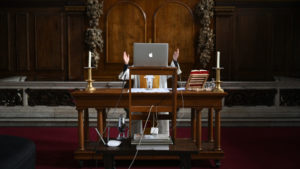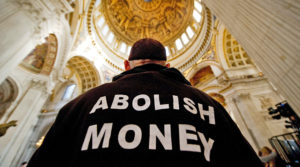No one in their right mind should want to be a bishop. It’s a terrible, terrible job. You spend half of your life in pointless meetings reading screeds of minutes covered in ghastly acronyms, and the other half going round the Diocese doing confirmations and ordinations, again and again on some kind of continual liturgical merry-go-round. While vicars have a base, and they can get to know their people over time, Bishops see new people every day, and their relationships can often be little more than meet and greet.
Spiritually it is extremely bad for you; people are either too nice or too horrible. Expectations are unrealistic: you are a fantasy of projection and a lightning-rod for disappointment. And every day having to put up with jokes about actresses and only being able to move diagonally… The golden rule is: if you really want to be a bishop, you almost certainly shouldn’t be one.
Things are about to get a whole lot worse. Bishops are the latest part of the church now slated for reinvention — part of the twaddle-riven Welby-era revolution that is totally transforming church structures.
Traditionally, the role of the bishop is to be a vicar to the vicars, to support the frontline pastorally, and to maintain sound doctrine within the church. They are pastors who know what good theology looks like. They carry a shepherd’s crook to indicate that they have authority over their flock, to direct the wayward sheep. But for the most part, the sheep still do as they please. And for those on the more catholic end of the spectrum, they exist to maintain an unbroken link of continuity with the early church – one bishop passing on the faith to another through the laying on of hands. They have lots of symbolic responsibility and little executive authority. These days, we would call it soft power.
They have a significant role in recruitment. But when a vicar gets handed the keys to his or her church, the bishop has less power to direct what goes on there than most people imagine. Subsidiarity in the Church of England — pushing control down to the parishes — was established to maintain the balance of power within that unique ecclesiological experiment that is the Church of England: a church that is both Catholic and Protestant at the same time. Subsidiarity, and the legal freehold for vicars that has been put place to protect it, exists to make sure a catholic-minded bishop won’t go round sacking evangelical clergy, or the other way round. It’s the same basic structure that exists to guarantee freedom of thought for academics who have tenure.
But, of course, the more you protect the freedom of the parish clergy, the less authority the bishop has over them. So, whereas a Roman Catholic Bishop could ring up one of his priests and ask him — require him — to move to a new parish, a Church of England bishop could do no such thing. Which is why the CofE is a good place to be a vicar and a bad place to be a bishop. And you can understand the frustration of the bishops. They get the blame for all the bad stuff and don’t have enough authority to change it. Even more so, the Archbishop of Canterbury. Little wonder, over the past few years, the steady stream of bishops going over to Rome now seems more like a Biblical flood. They have proper bishops over there, so goes the thought, and with enough authority to resist all the things that a retired Church of England bishop hasn’t been able to put a stop to.
The higher-ups in the Welby era have a different plan, and it is clever. Instead of seeing the administrative burden being imposed on the church as some sort of dead weight, they see it as an opportunity, as a route to power. These people no longer talk of bishops as being pastors or of the job being about ministry, they talk of “leadership” and “mission”. How my heart sinks when I hear those words.
They will absolutely deny this, of course, but the current travails of the Church of England, and the source of its internal acrimony, is that bishops – now recast as leaders — who have often only spent five minutes as parish priests, think that they know far better how to do the job. They are using the whole apparatus of the administrative church to find ways round the historic and legal protections that exist to defend the central model of a priest in their parish. In effect, they have decided to let the old model wither on the vine — by amalgamating parishes, cutting clergy posts when they become vacant — and redirecting funds to a whole new structure based on modern and secular lines of responsibility. The old church is too well protected legally, so they want to build a para church beside it, much better funded, but without the old legal protections. And one that is far more responsive to the “leadership”.
The cover for this transformation is the “let many flowers bloom” line. New ways can flourish alongside the old, they say. It’s a mixed economy. In some Dioceses — mine, in fact — this is how it is being played out. I’m lucky. But in others, the bishop has come to be seen as the enemy of traditional church structures i.e. the parish. That is what happened recently in Winchester, for example, where the bishop was forced to quit after an unprecedented rebellion by the parish clergy against his authoritarian manner and hostility to the old ways of doing church. And as bishops seek to use different channels to express their authority, parish clergy are joining unions — generally Unite — as never before. The old pastoral relationship between clergy and their bishop is being transformed into a business model, with more than a whiff of the acrimony that can exist between the boss class and the workers. “Save the Parish” is the fastest growing organisation in the church, and the mood is becoming more and more that of the awkward squad.
This is the context into which the Church of England now announces that it is considering a cabinet of senior bishops, with responsibility built around roles – Brexit bishop, Covid bishop and so on. The more Right-wing press thinks this is a foray into politics and that, as they are constantly saying, the church should stay out of it. But the church is intrinsically political because the Bible is. And there is no way a good Christian can stay out politics any more than they can stay out of pastoral care or worship. But the way the church approaches the political must be distinctive and grow out of its core convictions. Neither Right nor Left, the church isn’t party political. What is so utterly ridiculous about the idea of a Brexit bishop is that it gives the impression that the church tracks the secular way of politics, following it issue by issue. It is of a piece with the whole secularisation of the church that is now in full swing.
Yes, the secularisation of the church. It’s almost as if our bishops have been to a half-day management seminar at McKinsey and have suddenly seen the light as to how the church should be more efficiently run. Every day there is a new flowchart, a new initiative from head office. Most of the clergy I know inwardly grown and — because of their legal protections — just get on doing the stuff they have been called to do. We tend to ignore many of the smiley management-clergy who sit behind their Macs and offer structural and paper-based solutions to the tide going out on the sea of faith.
It is understandable that organisations that are under pressure – not least financially – can turn in on themselves, and think reorganisation is the answer to wider cultural changes. But for the Church of England to abandon its traditional shape, thinking that some corporate model will serve the preaching of the good news better, is for the church to commit a kind of suicide. The legal checks and balances within the CofE have been build up for a good reason: to hold us together, to make sure no one part of the Anglican compromise can hold sway over another. The cynic in me now contends that we are increasing becoming a church held together by a pension fund — that’s why so many bishops go to Rome as soon as they retire.
The fear is that this new non-parish-based para-church structure will grow rapidly, but will not be able to survive the forces that have always threatened to tear us apart, and that bishops (not leaders) have long kept together. The para church will be like the wheat thrown on stony ground, that rises up rapidly because the soil is shallow — which will look impressive on all those spreadsheets — but that ultimately cannot survive the heat of the midday sun because it has no roots.
Bishops root the church in history and in place. They hold it together as the focus of unity. When their job description starts getting played about with, the end feels close for the church that I dearly love.
Disclaimer
Some of the posts we share are controversial and we do not necessarily agree with them in the whole extend. Sometimes we agree with the content or part of it but we do not agree with the narration or language. Nevertheless we find them somehow interesting, valuable and/or informative or we share them, because we strongly believe in freedom of speech, free press and journalism. We strongly encourage you to have a critical approach to all the content, do your own research and analysis to build your own opinion.
We would be glad to have your feedback.
Source: UnHerd Read the original article here: https://unherd.com



